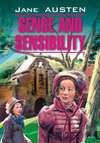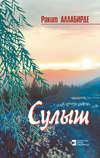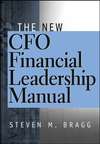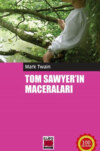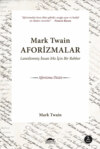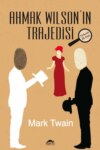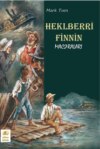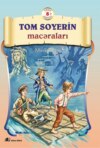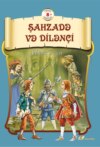Kitabı oku: «The Adventures of Huckleberry Finn», sayfa 12
CHAPTER XXIV
Next day, towards night, we laid up under a little willow towhead out in the middle, where there was a village on each side of the river, and the duke and the king begun to lay out a plan for working them towns. Jim he spoke to the duke, and said he hoped it wouldn't take but a few hours, because it got mighty heavy and tiresome to him when he had to lay all day in the wigwam tied with the rope. You see, when we left him all alone we had to tie him, because if anybody happened on to him all by himself and not tied it wouldn't look much like he was a runaway nigger, you know. So the duke said it was kind of hard to have to lay roped all day, and he'd cipher out some way to get around it.
He was uncommon bright, the duke was, and he soon struck it. He dressed Jim up in King Lear's outfit – it was a long curtain-calico gown, and a white horse-hair wig and whiskers; and then he took his theater paint and painted Jim's face and hands and ears and neck all over a dead, dull solid blue, like a man that's been drownded nine days. Blamed if he warn't the horriblest-looking outrage I ever see. Then the duke took and wrote out a sign on a shingle so:
Sick Arab – but harmless when not out of his head.
And he nailed that shingle to a lath, and stood the lath up four or five foot in front of the wigwam. Jim was satisfied. He said it was a sight better than lying tied a couple of years every day, and trembling all over every time there was a sound. The duke told him to make himself free and easy, and if anybody ever come meddling around, he must hop out of the wigwam, and carry on a little, and fetch a howl or two like a wild beast, and he reckoned they would light out and leave him alone. Which was sound enough judgment; but you take the average man, and he wouldn't wait for him to howl. Why, he didn't only look like he was dead, he looked considerable more than that.
These rapscallions wanted to try the Nonesuch again, because there was so much money in it, but they judged it wouldn't be safe, because maybe the news might 'a' worked along down by this time. They couldn't hit no project that suited exactly; so at last the duke said he reckoned he'd lay off and work his brains an hour or two and see if he couldn't put up something on the Arkansaw village; and the king he allowed he would drop over to t'other village without any plan, but just trust in Providence to lead him the profitable way – meaning the devil, I reckon. We had all bought store clothes where we stopped last; and now the king put his'n on, and he told me to put mine on. I done it, of course. The king's duds was all black, and he did look real swell and starchy. I never knowed how clothes could change a body before. Why, before, he looked like the orneriest old rip that ever was; but now, when he'd take off his new white beaver and make a bow and do a smile, he looked that grand and good and pious that you'd say he had walked right out of the ark, and maybe was old Leviticus himself. Jim cleaned up the canoe, and I got my paddle ready. There was a big steamboat laying at the shore away up under the point, about three mile above the town – been there a couple of hours, taking on freight. Says the king:
"Seein' how I'm dressed, I reckon maybe I better arrive down from St. Louis or Cincinnati, or some other big place. Go for the steamboat, Huckleberry; we'll come down to the village on her."
I didn't have to be ordered twice to go and take a steamboat ride. I fetched the shore a half a mile above the village, and then went scooting along the bluff bank in the easy water. Pretty soon we come to a nice innocent-looking young country jake setting on a log swabbing the sweat off of his face, for it was powerful warm weather; and he had a couple of big carpet-bags by him.
"Run her nose inshore," says the king. I done it. "Wher' you bound for, young man?"
"For the steamboat; going to Orleans."
"Git aboard," says the king. "Hold on a minute, my servant 'll he'p you with them bags. Jump out and he'p the gentleman, Adolphus" – meaning me, I see.
I done so, and then we all three started on again. The young chap was mighty thankful; said it was tough work toting his baggage such weather. He asked the king where he was going, and the king told him he'd come down the river and landed at the other village this morning, and now he was going up a few mile to see an old friend on a farm up there. The young fellow says:
"When I first see you I says to myself, 'It's Mr. Wilks, sure, and he come mighty near getting here in time.' But then I says again, 'No, I reckon it ain't him, or else he wouldn't be paddling up the river.' You ain't him, are you?"
"No, my name's Blodgett – Elexander Blodgett —Reverend Elexander Blodgett, I s'pose I must say, as I'm one o' the Lord's poor servants. But still I'm jist as able to be sorry for Mr. Wilks for not arriving in time, all the same, if he's missed anything by it – which I hope he hasn't."
"Well, he don't miss any property by it, because he'll get that all right; but he's missed seeing his brother Peter die – which he mayn't mind, nobody can tell as to that – but his brother would 'a' give anything in this world to see him before he died; never talked about nothing else all these three weeks; hadn't seen him since they was boys together – and hadn't ever seen his brother William at all – that's the deef and dumb one – William ain't more than thirty or thirty-five. Peter and George were the only ones that come out here; George was the married brother; him and his wife both died last year. Harvey and William's the only ones that's left now; and, as I was saying, they haven't got here in time."
"Did anybody send 'em word?"
"Oh, yes; a month or two ago, when Peter was first took; because Peter said then that he sorter felt like he warn't going to get well this time. You see, he was pretty old, and George's g'yirls was too young to be much company for him, except Mary Jane, the red-headed one; and so he was kinder lonesome after George and his wife died, and didn't seem to care much to live. He most desperately wanted to see Harvey – and William, too, for that matter – because he was one of them kind that can't bear to make a will. He left a letter behind for Harvey, and said he'd told in it where his money was hid, and how he wanted the rest of the property divided up so George's g'yirls would be all right – for George didn't leave nothing. And that letter was all they could get him to put a pen to."
"Why do you reckon Harvey don't come? Wher' does he live?"
"Oh, he lives in England – Sheffield – preaches there – hasn't ever been in this country. He hasn't had any too much time – and besides he mightn't 'a' got the letter at all, you know."
"Too bad, too bad he couldn't 'a' lived to see his brothers, poor soul. You going to Orleans, you say?"
"Yes, but that ain't only a part of it. I'm going in a ship, next Wednesday, for Ryo Janeero, where my uncle lives."
"It's a pretty long journey. But it'll be lovely; I wisht I was a-going. Is Mary Jane the oldest? How old is the others?"
"Mary Jane's nineteen, Susan's fifteen, and Joanna's about fourteen – that's the one that gives herself to good works and has a hare-lip."
"Poor things! to be left alone in the cold world so."
"Well, they could be worse off. Old Peter had friends, and they ain't going to let them come to no harm. There's Hobson, the Babtis' preacher; and Deacon Lot Hovey, and Ben Rucker, and Abner Shackleford, and Levi Bell, the lawyer; and Dr. Robinson, and their wives, and the widow Bartley, and – well, there's a lot of them; but these are the ones that Peter was thickest with, and used to write about sometimes, when he wrote home; so Harvey 'll know where to look for friends when he gets here."
Well, the old man went on asking questions till he just fairly emptied that young fellow. Blamed if he didn't inquire about everybody and everything in that blessed town, and all about the Wilkses; and about Peter's business – which was a tanner; and about George's – which was a carpenter; and about Harvey's – which was a dissentering minister; and so on, and so on. Then he says:
"What did you want to walk all the way up to the steamboat for?"
"Because she's a big Orleans boat, and I was afeard she mightn't stop there. When they're deep they won't stop for a hail. A Cincinnati boat will, but this is a St. Louis one."
"Was Peter Wilks well off?"
"Oh, yes, pretty well off. He had houses and land, and it's reckoned he left three or four thousand in cash hid up som'ers."
"When did you say he died?"
"I didn't say, but it was last night."
"Funeral to-morrow, likely?"
"Yes, 'bout the middle of the day."
"Well, it's all terrible sad; but we've all got to go, one time or another. So what we want to do is to be prepared; then we're all right."
"Yes, sir, it's the best way. Ma used to always say that."
When we struck the boat she was about done loading, and pretty soon she got off. The king never said nothing about going aboard, so I lost my ride, after all. When the boat was gone the king made me paddle up another mile to a lonesome place, and then he got ashore and says:
"Now hustle back, right off, and fetch the duke up here, and the new carpet-bags. And if he's gone over to t'other side, go over there and git him. And tell him to git himself up regardless. Shove along, now."
I see what he was up to; but I never said nothing, of course. When I got back with the duke we hid the canoe, and then they set down on a log, and the king told him everything, just like the young fellow had said it – every last word of it. And all the time he was a-doing it he tried to talk like an Englishman; and he done it pretty well, too, for a slouch. I can't imitate him, and so I ain't a-going to try to; but he really done it pretty good. Then he says:
"How are you on the deef and dumb, Bilgewater?"
The duke said, leave him alone for that; said he had played a deef and dumb person on the histrionic boards. So then they waited for a steamboat.
About the middle of the afternoon a couple of little boats come along, but they didn't come from high enough up the river; but at last there was a big one, and they hailed her. She sent out her yawl, and we went aboard, and she was from Cincinnati; and when they found we only wanted to go four or five mile they was booming mad, and gave us a cussing, and said they wouldn't land us. But the king was ca'm. He says:
"If gentlemen kin afford to pay a dollar a mile apiece to be took on and put off in a yawl, a steamboat kin afford to carry 'em, can't it?"
So they softened down and said it was all right; and when we got to the village they yawled us ashore. About two dozen men flocked down when they see the yawl a-coming, and when the king says:
"Kin any of you gentlemen tell me wher' Mr. Peter Wilks lives?" they give a glance at one another, and nodded their heads, as much as to say, "What 'd I tell you?" Then one of them says, kind of soft and gentle:
"I'm sorry, sir, but the best we can do is to tell you where he did live yesterday evening."
Sudden as winking the ornery old cretur went all to smash, and fell up against the man, and put his chin on his shoulder, and cried down his back, and says:
"Alas, alas, our poor brother – gone, and we never got to see him; oh, it's too, too hard!"
Then he turns around, blubbering, and makes a lot of idiotic signs to the duke on his hands, and blamed if he didn't drop a carpet-bag and bust out a-crying. If they warn't the beatenest lot, them two frauds, that ever I struck.
Well, the men gathered around and sympathized with them, and said all sorts of kind things to them, and carried their carpet-bags up the hill for them, and let them lean on them and cry, and told the king all about his brother's last moments, and the king he told it all over again on his hands to the duke, and both of them took on about that dead tanner like they'd lost the twelve disciples. Well, if ever I struck anything like it, I'm a nigger. It was enough to make a body ashamed of the human race.
CHAPTER XXV
The news was all over town in two minutes, and you could see the people tearing down on the run from every which way, some of them putting on their coats as they come. Pretty soon we was in the middle of a crowd, and the noise of the tramping was like a soldier march. The windows and dooryards was full; and every minute somebody would say, over a fence:
"Is it them?"
And somebody trotting along with the gang would answer back and say:
"You bet it is."
When we got to the house the street in front of it was packed, and the three girls was standing in the door. Mary Jane was red-headed, but that don't make no difference, she was most awful beautiful, and her face and her eyes was all lit up like glory, she was so glad her uncles was come. The king he spread his arms, and Mary Jane she jumped for them, and the hare-lip jumped for the duke, and there they had it! Everybody most, leastways women, cried for joy to see them meet again at last and have such good times.
Then the king he hunched the duke private – I see him do it – and then he looked around and see the coffin, over in the corner on two chairs; so then him and the duke, with a hand across each other's shoulder, and t'other hand to their eyes, walked slow and solemn over there, everybody dropping back to give them room, and all the talk and noise stopping, people saying "'Sh!" and all the men taking their hats off and drooping their heads, so you could 'a' heard a pin fall. And when they got there they bent over and looked in the coffin, and took one sight, and then they bust out a-crying so you could 'a' heard them to Orleans, most; and then they put their arms around each other's necks, and hung their chins over each other's shoulders; and then for three minutes, or maybe four, I never see two men leak the way they done. And, mind you, everybody was doing the same; and the place was that damp I never see anything like it. Then one of them got on one side of the coffin, and t'other on t'other side, and they kneeled down and rested their foreheads on the coffin, and let on to pray all to themselves. Well, when it come to that it worked the crowd like you never see anything like it, and everybody broke down and went to sobbing right out loud – the poor girls, too; and every woman, nearly, went up to the girls, without saying a word, and kissed them, solemn, on the forehead, and then put their hand on their head, and looked up towards the sky, with the tears running down, and then busted out and went off sobbing and swabbing, and give the next woman a show. I never see anything so disgusting. Well, by and by the king he gets up and comes forward a little, and works himself up and slobbers out a speech, all full of tears and flapdoodle, about its being a sore trial for him and his poor brother to lose the diseased, and to miss seeing diseased alive after the long journey of four thousand mile, but it's a trial that's sweetened and sanctified to us by this dear sympathy and these holy tears, and so he thanks them out of his heart and out of his brother's heart, because out of their mouths they can't, words being too weak and cold, and all that kind of rot and slush, till it was just sickening; and then he blubbers out a pious goody-goody Amen, and turns himself loose and goes to crying fit to bust.
And the minute the words were out of his mouth somebody over in the crowd struck up the doxolojer, and everybody joined in with all their might, and it just warmed you up and made you feel as good as church letting out. Music is a good thing; and after all that soul-butter and hogwash I never see it freshen up things so, and sound so honest and bully.
Then the king begins to work his jaw again, and says how him and his nieces would be glad if a few of the main principal friends of the family would take supper here with them this evening, and help set up with the ashes of the diseased; and says if his poor brother laying yonder could speak he knows who he would name, for they was names that was very dear to him, and mentioned often in his letters; and so he will name the same, to wit, as follows, viz.: – Rev. Mr. Hobson, and Deacon Lot Hovey, and Mr. Ben Rucker, and Abner Shackleford, and Levi Bell, and Dr. Robinson, and their wives, and the widow Bartley.
Rev. Hobson and Dr. Robinson was down to the end of the town a-hunting together – that is, I mean the doctor was shipping a sick man to t'other world, and the preacher was pinting him right. Lawyer Bell was away up to Louisville on business. But the rest was on hand, and so they all come and shook hands with the king and thanked him and talked to him; and then they shook hands with the duke and didn't say nothing, but just kept a-smiling and bobbing their heads like a passel of sapheads whilst he made all sorts of signs with his hands and said "Goo-goo – goo-goo-goo" all the time, like a baby that can't talk.
So the king he blattered along, and managed to inquire about pretty much everybody and dog in town, by his name, and mentioned all sorts of little things that happened one time or another in the town, or to George's family, or to Peter. And he always let on that Peter wrote him the things; but that was a lie: he got every blessed one of them out of that young flathead that we canoed up to the steamboat.
Then Mary Jane she fetched the letter her father left behind, and the king he read it out loud and cried over it. It give the dwelling-house and three thousand dollars, gold, to the girls; and it give the tanyard (which was doing a good business), along with some other houses and land (worth about seven thousand), and three thousand dollars in gold to Harvey and William, and told where the six thousand cash was hid down cellar. So these two frauds said they'd go and fetch it up, and have everything square and above-board; and told me to come with a candle. We shut the cellar door behind us, and when they found the bag they spilt it out on the floor, and it was a lovely sight, all them yaller-boys. My, the way the king's eyes did shine! He slaps the duke on the shoulder and says:
"Oh, this ain't bully nor noth'n! Oh, no, I reckon not! Why, Biljy, it beats the Nonesuch, don't it?"
The duke allowed it did. They pawed the yaller-boys, and sifted them through their fingers and let them jingle down on the floor; and the king says:
"It ain't no use talkin'; bein' brothers to a rich dead man and representatives of furrin heirs that's got left is the line for you and me, Bilge. Thish yer comes of trust'n to Providence. It's the best way, in the long run. I've tried 'em all, and ther' ain't no better way."
Most everybody would 'a' been satisfied with the pile, and took it on trust; but no, they must count it. So they counts it, and it comes out four hundred and fifteen dollars short. Says the king:
"Dern him, I wonder what he done with that four hundred and fifteen dollars?"
They worried over that awhile, and ransacked all around for it. Then the duke says:
"Well, he was a pretty sick man, and likely he made a mistake – I reckon that's the way of it. The best way's to let it go, and keep still about it. We can spare it."
"Oh, shucks, yes, we can spare it. I don't k'yer noth'n 'bout that – it's the count I'm thinkin' about. We want to be awful square and open and above-board here, you know. We want to lug this h'yer money up-stairs and count it before everybody – then ther' ain't noth'n suspicious. But when the dead man says ther's six thous'n dollars, you know, we don't want to – "
"Hold on," says the duke. "Le's make up the deffisit," and he begun to haul out yaller-boys out of his pocket.
"It's a most amaz'n' good idea, duke – you have got a rattlin' clever head on you," says the king. "Blest if the old Nonesuch ain't a heppin' us out ag'in," and he begun to haul out yaller-jackets and stack them up.
It most busted them, but they made up the six thousand clean and clear.
"Say," says the duke, "I got another idea. Le's go up-stairs and count this money, and then take and give it to the girls."
"Good land, duke, lemme hug you! It's the most dazzling idea 'at ever a man struck. You have cert'nly got the most astonishin' head I ever see. Oh, this is the boss dodge, ther' ain't no mistake 'bout it. Let 'em fetch along their suspicions now if they want to – this 'll lay 'em out."
When we got up-stairs everybody gethered around the table, and the king he counted it and stacked it up, three hundred dollars in a pile – twenty elegant little piles. Everybody looked hungry at it, and licked their chops. Then they raked it into the bag again, and I see the king begin to swell himself up for another speech. He says:
"Friends all, my poor brother that lays yonder has done generous by them that's left behind in the vale of sorrers. He has done generous by these yer poor little lambs that he loved and sheltered, and that's left fatherless and motherless. Yes, and we that knowed him knows that he would 'a' done more generous by 'em if he hadn't ben afeard o' woundin' his dear William and me. Now, wouldn't he? Ther' ain't no question 'bout it in my mind. Well, then, what kind o' brothers would it be that 'd stand in his way at sech a time? And what kind o' uncles would it be that 'd rob – yes, Rob– sech poor sweet lambs as these 'at he loved so at sech a time? If I know William – and I think I do – he – well, I'll jest ask him." He turns around and begins to make a lot of signs to the duke with his hands, and the duke he looks at him stupid and leather-headed awhile; then all of a sudden he seems to catch his meaning, and jumps for the king, goo-gooing with all his might for joy, and hugs him about fifteen times before he lets up. Then the king says, "I knowed it; I reckon that 'll convince anybody the way he feels about it. Here, Mary Jane, Susan, Joanner, take the money – take it all. It's the gift of him that lays yonder, cold but joyful."
Mary Jane she went for him, Susan and the hare-lip went for the duke, and then such another hugging and kissing I never see yet. And everybody crowded up with the tears in their eyes, and most shook the hands off of them frauds, saying all the time:
"You dear good souls! – how lovely!– how could you!"
Well, then, pretty soon all hands got to talking about the diseased again, and how good he was, and what a loss he was, and all that; and before long a big iron-jawed man worked himself in there from outside, and stood a-listening and looking, and not saying anything; and nobody saying anything to him either, because the king was talking and they was all busy listening. The king was saying – in the middle of something he'd started in on —
" – they bein' partickler friends o' the diseased. That's why they're invited here this evenin'; but tomorrow we want all to come – everybody; for he respected everybody, he liked everybody, and so it's fitten that his funeral orgies sh'd be public."
And so he went a-mooning on and on, liking to hear himself talk, and every little while he fetched in his funeral orgies again, till the duke he couldn't stand it no more; so he writes on a little scrap of paper, "Obsequies, you old fool," and folds it up, and goes to goo-gooing and reaching it over people's heads to him. The king he reads it and puts it in his pocket, and says:
"Poor William, afflicted as he is, his heart's aluz right. Asks me to invite everybody to come to the funeral – wants me to make 'em all welcome. But he needn't 'a' worried – it was jest what I was at."
Then he weaves along again, perfectly ca'm, and goes to dropping in his funeral orgies again every now and then, just like he done before. And when he done it the third time he says:
"I say orgies, not because it's the common term, because it ain't – obsequies bein' the common term – but because orgies is the right term. Obsequies ain't used in England no more now – it's gone out. We say orgies now in England. Orgies is better, because it means the thing you're after more exact. It's a word that's made up out'n the Greek orgo, outside, open, abroad; and the Hebrew jeesum, to plant, cover up; hence inter. So, you see, funeral orgies is an open er public funeral."
He was the worst I ever struck. Well, the iron-jawed man he laughed right in his face. Everybody was shocked. Everybody says, "Why, doctor!" and Abner Shackleford says:
"Why, Robinson, hain't you heard the news? This is Harvey Wilks."
The king he smiled eager, and shoved out his flapper, and says:
"Is it my poor brother's dear good friend and physician? I – "
"Keep your hands off me!" says the doctor. "You talk like an Englishman, don't you? It's the worst imitation I ever heard. You Peter Wilks's brother! You're a fraud, that's what you are!"
Well, how they all took on! They crowded around the doctor and tried to quiet him down, and tried to explain to him and tell him how Harvey's showed in forty ways that he was Harvey, and knowed everybody by name, and the names of the very dogs, and begged and begged him not to hurt Harvey's feelings and the poor girls' feelings, and all that. But it warn't no use; he stormed right along, and said any man that pretended to be an Englishman and couldn't imitate the lingo no better than what he did was a fraud and a liar. The poor girls was hanging to the king and crying; and all of a sudden the doctor ups and turns on them. He says:
"I was your father's friend, and I'm your friend; and I warn you as a friend, and an honest one that wants to protect you and keep you out of harm and trouble, to turn your backs on that scoundrel and have nothing to do with him, the ignorant tramp, with his idiotic Greek and Hebrew, as he calls it. He is the thinnest kind of an impostor – has come here with a lot of empty names and facts which he picked up somewheres; and you take them for proofs, and are helped to fool yourselves by these foolish friends here, who ought to know better. Mary Jane Wilks, you know me for your friend, and for your unselfish friend, too. Now listen to me; turn this pitiful rascal out – I beg you to do it. Will you?"
Mary Jane straightened herself up, and my, but she was handsome! She says:
"Here is my answer." She hove up the bag of money and put it in the king's hands, and says, "Take this six thousand dollars, and invest for me and my sisters any way you want to, and don't give us no receipt for it."
Then she put her arm around the king on one side, and Susan and the hare-lip done the same on the other. Everybody clapped their hands and stomped on the floor like a perfect storm, whilst the king held up his head and smiled proud. The doctor says:
"All right; I wash my hands of the matter. But I warn you all that a time's coming when you're going to feel sick whenever you think of this day." And away he went.
"All right, doctor," says the king, kinder mocking him; "we'll try and get 'em to send for you;" which made them all laugh, and they said it was a prime good hit.


